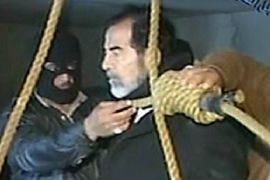Saddam hanged at dawn
Iraqi television has broadcast footage of the moments leading up to his execution.

Published On 27 Oct 2007
Celebrations
| Death of Saddam |
After the execution, the Iraqi prime minister, Nuri al-Maliki, urged Saddam’s fellow Baathists to reconsider their tactics and join the political process.
“I urged followers of the ousted regime to reconsider their stance as the door is still open to anyone who has no innocent blood on his hands, to help in rebuilding an Iraq for all Iraqis,” he said.
In Sadr City, a Shia area of Baghdad, people danced in the streets while others fired guns in the air to celebrate the former leader’s death.
Kurds also welcomed the hanging and the office of the Kurdish regional president, Massud Barzani, issued a statement saying: “We hope that Saddam Hussein’s execution will open a new chapter among Iraqis and the end of using violence against civilians.”
Violence in Iraq continued on Saturday after Saddam’s death and at least 30 people were killed when a bomb exploded in a fish market south of Baghdad in the first.
US satisfaction
George Bush said that the execution was an important milestone on the country’s path to democracy.
 |
| Iraqi Shias in Sadr City celebrated the death of the former Iraqi leader [AFP] |
“Bringing Saddam Hussein to justice will not end the violence in Iraq, but it is an important milestone on Iraq’s course to becoming a democracy that can govern, sustain, and defend itself,” the US president said in a statement.
An appeals court had upheld the death penalty on Tuesday and the Iraqi government rushed through the procedures to hang Saddam by the end of the year and before the Eid al-Adha holiday, which starts on Saturday.
Saddam’s half-brother, Barzan al-Tikriti, and a former judge, Awad al-Bander, also sentenced to death for their roles in the killings of the villagers in Dujail, will be hanged after Eid, officials said on Saturday.
Hanging footage
The execution took place at an Iraqi army base in Kadhimiya. The base was the former headquarters for Saddam’s military intelligence where many of his victims were tortured and executed in the same gallows.
The northern Baghdad district is also home to one of Shia Islam’s holiest shrines.
| Your Views |
|
“Saddam’s death will serve only to hasten World War III” Andrew, Isle of Wight, UK |
The government had kept details of the execution plan secret amid concerns that it may provoke a violent backlash from Saddam’s supporters with Iraq on the brink of civil war.
“It was very quick. He died right away,” an official Iraqi witnesses told the Reuters news agency.
Sami al-Askari, a political ally of al-Maliki, said: “We heard his neck snap.”
Another witness said: “He seemed very calm. He did not tremble.”
As guards took him to the scaffold, according to witnesses, Saddam said: “There is no God but God and Muhammad is his prophet.”
Criticism
During his three decades in power, Saddam was accused of widespread oppression of political opponents and genocide against Kurds in northern Iraq. His execution means that he will never face justice on those charges.
Others have questioned the timing of the killing, coming at the beginning of the Muslim holiday of Eid al-Adha.
Saddam insisted during his trial that he was still the president of Iraq. He said in a letter written after his conviction that he offered himself as a “sacrifice”.
“If my soul goes down this path [of martyrdom] it will face God in serenity,” he wrote in the letter.
‘Biased’ trial
Saddam’s defence team and human rights groups complained that the former Iraqi leader had not recieved a fair trial.
Najeeb Al-Nuaimi, one of the defence lawyers, told Al Jazeera: “There was bias, the prosecution sided with their politicians, it was an ethnically established court with three Shia and one Sunni.”
The US-based rights group Human Rights Watch condemned the hanging, saying history would judge his trial and execution harshly.
Richard Dicker, a Human Rights Watch director, said: “Saddam Hussein was responsible for horrific, widespread human rights violations, but those acts, however brutal, cannot justify his execution, a cruel and inhuman punishment.”
Source: Al Jazeera, News Agencies